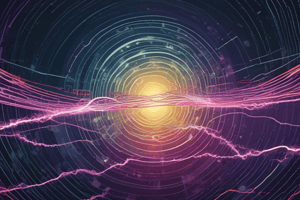Podcast
Questions and Answers
What is the standard unit for measuring electric current?
What is the standard unit for measuring electric current?
- Amperes (A) (correct)
- Watts (W)
- Joules (J)
- Ohms (Ω)
In which direction does electric current flow in a traditional direct current setup?
In which direction does electric current flow in a traditional direct current setup?
- Stays stationary between the terminals
- From a region with lower potential to a region with higher potential
- From the negative terminal to the positive terminal
- From the positive terminal to the negative terminal (correct)
Which type of electric current is more commonly used in power distribution networks?
Which type of electric current is more commonly used in power distribution networks?
- Static Current (SC)
- Direct Current (DC)
- Alternating Current (AC) (correct)
- Inverse Current (IC)
What instrument is used to measure electric current?
What instrument is used to measure electric current?
Why is electric current essential for appliances, computers, and electronic devices?
Why is electric current essential for appliances, computers, and electronic devices?
What is a crucial safety measure to minimize the risk of electric current to humans, animals, and equipment?
What is a crucial safety measure to minimize the risk of electric current to humans, animals, and equipment?
In what way do electric vehicles and trains utilize electric current?
In what way do electric vehicles and trains utilize electric current?
Why is it important for electric equipment to be properly grounded?
Why is it important for electric equipment to be properly grounded?
What is one reason that understanding electric current is crucial for maintaining a safe environment?
What is one reason that understanding electric current is crucial for maintaining a safe environment?
How does electric current play a role in the transmission of energy in power plants?
How does electric current play a role in the transmission of energy in power plants?
What is the purpose of writing a chemical reaction in the form of a word-equation?
What is the purpose of writing a chemical reaction in the form of a word-equation?
In a word-equation, where are the products of a chemical reaction typically written?
In a word-equation, where are the products of a chemical reaction typically written?
What purpose does the arrow in a word-equation serve?
What purpose does the arrow in a word-equation serve?
Flashcards are hidden until you start studying
Study Notes
Exploring Electric Current: A Comprehensive Guide
Electric current is a fundamental concept in the world of physics, electricity, and electronics. In this article, we will explore the concept of electric current, its forms, and the ways it affects our daily lives.
What is Electric Current?
Electric current is the flow of electric charge, usually in the form of electrons, through a conductor. This flow occurs due to a potential difference, such as the difference in electric charges between two points. The direction of the electric current is determined by the flow of positive charge (conventionally, electrons) from a region with higher electrical potential to a region with lower potential.
Types of Electric Current
There are two main types of electric current:
-
Direct Current (DC): In a direct current, the electric charge flows in a constant direction. For example, a flashlight uses DC, as the electrons flow from the positive terminal of the battery to the negative terminal.
-
Alternating Current (AC): Alternating current periodically changes its direction, switching from positive to negative and back. AC is more common in power distribution networks, as it allows for efficient transmission of electricity over long distances.
Electric Current Measurement
Electric current is measured using an instrument called an ammeter. The ammeter's reading is in units of amperes (A), which is the standard unit for measuring electric current.
Electric Current Applications
We encounter electric current in almost all aspects of our daily lives. Some applications include:
-
Lighting: Incandescent, fluorescent, and LED lighting all rely on the flow of electric current to generate light.
-
Powering devices: Appliances, computers, and other electronic devices rely on electric current to function.
-
Transportation: Electric vehicles and trains use electric current to power their engines, providing a cleaner alternative to traditional transportation.
-
Communication: Telephones, radios, and the internet all rely on electric current to transmit information.
-
Energy production and transmission: Electric power plants and energy transmission systems utilize electric current to generate and distribute power.
Electric Current Safety
Electric current can pose a significant danger to humans, animals, and equipment. To minimize the risk, it is essential to:
-
Avoid contact with electrical sources when not necessary.
-
Use appropriate electrical safety equipment, such as insulated tools and protective gloves.
-
Ensure that electrical equipment is properly grounded.
-
Maintain electrical equipment regularly to prevent electrical hazards.
Conclusion
Electric current is a fundamental building block of our modern society, playing an essential role in powering technology, lighting, and transportation. Understanding the principles of electric current and its applications is crucial for maintaining a safe and efficient environment. By appreciating the importance of electric current and the dangers it can pose, we can better comprehend the world around us and take the necessary precautions to avoid electrical hazards.
Studying That Suits You
Use AI to generate personalized quizzes and flashcards to suit your learning preferences.




